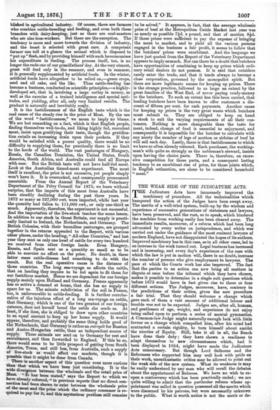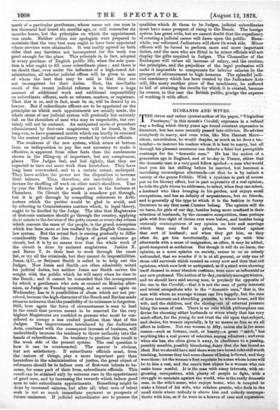THE WEAK SIDE OF THE JUDICATURE ACTS. T HE Judicature Acts
have immensely improved the machinery of procedure. All the technicalities which hampered the action of the Judges have been swept away. The merits of a well-tried system, built-up by the wisdom and experience of successive generations of statesmen and lawyers, have been preserved, and the rust, so to speak, which hindered the machine from working easily has been cleared away. The immediate results, moreover, of a reform which had been long advocated by every writer on jurisprudence, and which was carried out under the guidance of the most eminent lawyers of modern England, have not disappointed the hopes of its authors. Improved machinery has in this case, as in all other cases, led to an increase in the work turned out. Legal business has increased and is increasing, and every day's experience of the ease with which the law is put in motion will, there is no doubt, increase the number of persons who give employment to lawyers. The pace at which the Courts work has also improved. The fact that the parties to an action can now bring all matters in dispute at once before the tribunal which they have chosen, makes it possible to determine in a single suit questions which before 1875 would have in fact given rise to three or four different actions. The Judges, moreover, have, contrary to the predictions of their critics, given the new procedure a fair trial. That they should welcome a change which gave each of them a vast amount of additional labour and trouble was not to be expected. Judges are, after all, human, and gentlemen of age, weight, and experience do not enjoy being called upon to perform a series of mental gymnastics. A Common-law Judge might naturally enough look with little favour on a change which compelled him, after his mind had contracted a certain rigidity, to turn himself about amidst the niceties of Equity. Still, take it all in all, the Bench have done their duty ; they have shown a readiness to adapt themselves to new circumstances which, had it been displayed in 1854, might have made the Judicature Acts unnecessary. But though Lord Selborne and the Reformers who supported him may well look with pride on their work, unenthusiastic critics may be allowed to point out the weak side of the new system. What its weakness is may be easily understood by any man who will recall the debates about the appointment of Referees. We have no wish to re- open a controversy which has been practically ended ; we are quite willing to admit that the particular referee whose ap- pointment was called in question possessed all the merits which were discerned by his patrons, but were necessarily unknown to the public. What is worth notice is not the merit or de. merit of a particular gentleman, whose name not one man in ten thousand had heard six months ago, or will remember six months hence, but the principles on which the appointment was made. Neither critics nor apologists were prepared to maintain that the very best man ought to have been appointed whose services were attainable. It was tacitly agreed on both sides that any barrister not incompetent for the work was good enough for the place. This principle is, in fact, adopted in every province of English public life, when the sole ques- tion is who ought to fill some subordinate place ; and there is• no doubt that, even under the influence of a high-toned Ad- ministration, all inferior judicial offices will be given to men of whom the best that may be said is that they are not incompetent for their duties. Now, the inevitable result of the recent judicial reforms is to throw a huge amount of additional work and additional responsibility on subordinate officers, such as referees, masters, or registrars. That this is so, and in fact, must be so, will be denied by no lawyer. But if subordinate officers are to be appointed on the principles on which such appointments are usually made, the whole stress of our judicial system will gradually but certainly fall on the shoulders of men who may be respectable, but cer- tainly will not be eminent. An antiquated mode of procedure administered by first-rate magistrates will be found, in the long-run, to have possessed merits which can hardly be retained by the neatest judicial machinery worked by inferior officials.
The weakness of the new system, which arises at bottom from an indisposition to pay the cost necessary to make it effective, is apparent from other facts than the carelessness shown in the filling-up of important, but not conspicuous, places. The Judges feel, and feel rightly, that they are expected to turn out more work than heretofore. They have long been overworked, and to a certain extent, underpaid. They have neither the power nor the disposition to increase their labours. They, therefore, are inevitably driven to devices for shuffling off work on other men's shoulders. Year by year the Masters take a greater part in the business at Chambers. On Circuit the work is somehow got through, but it is got through by compelling references to Arbi- trators which the parties would be glad to avoid, and by referring to Commissioners matters which, in legal theory, ought to be decided by the Judge. The idea that Magistrates of first-rate eminence should go through the country, applying their minds to the decision of the petty causes or every-day crimes which concern the mass of the people, is the grand conception which has been more or less realised by the English Common- law system. But the actual fact is coming gradually to differ considerably from the idea. Judges of great eminence go circuit, but it is by no means true that the whole work of the circuit is done by eminent magistrates. Justice X. and Baron Y. do their best to work through the cause list, or try all the criminals, but they cannot do impossibilities. Jones, Q.C., or Serjeant Smith is called in to help out the Judges. Now Jones and Smith .are often admirably suited for judicial duties, but neither Jones nor Smith carries the weight with the public which he will carry when he rises to the Bench ; and it cannot be concealed that the arrangement by which a gentleman who acts as counsel on Monday after- noon, as Judge on Tuesday morning, and as counsel again on Wednesday, has in it possibilities of abuse which are not per- ceived, because the high character of the Bench and Bar has made abuse so unknown that the possibility of its existence is forgotten. Still, here again the force of circumstances is seen to lead to the result that powers meant to be reserved for the very highest Magistrates are confided to persons who must be con- sidered to occupy a less exalted position than that of the Judges. The improvements introduced by the Judicature Acts, combined with the consequent increase of business, will undoubtedly increase the tendency to throw authority into the hands of subordinates. Its tendency to produce this result is the weak side of the present system. The real question is how it can be counteracted. The answer is obvious, but not satisfactory. If subordinate officials must, from the nature of things, play a more important part than heretofore in the administration of justice, the great object of reformers should be to induce men of first-rate talents to be- come, for some part of their lives, subordinate officials. This result can be attained only by extreme care in the appointment of good men, and by increasing the rewards which induce good men to take subordinate appointments. Something might be done by increased salaries, but after all, what men of talent seek is not so much immediate payment as prospects of future eminence. If judicial subordinates are to possess the qualities which fit them to be Judges, judicial subordinates must have some prospect of rising to the Bench. The foreign system has great evils, but we cannot doubt that the expediency of creating a judicial career will dawn upon the public. Mean- while, our reformed Judicature will show its weak side. Minor officers will be forced to perform more and more important duties, and the men who are fitted to be minor officials will not display the gifts required in Judges. The Chancellor of the Exchequer will refuse all increase of salary, and the routine, the principles, and the prejudices of the legal profession will make it impossible to compensate for inferior salaries by the prospect of advancement to high honours. The splendid judi- cial machinery which has been created by the Judicature Acts will, like many another piece of fine machinery, be suffered to fail of attaining the results for which it is created, because its owners, in this case the British public, grudge the expense of working it with effect.































 Previous page
Previous page